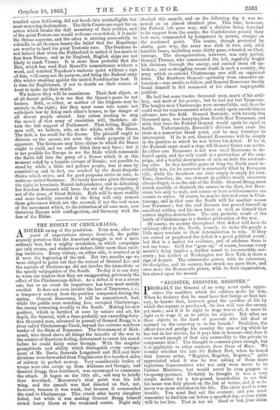THE RESULT OF CHICKAMAUGA.
ANOTHER swing of the pendulum. Even now, after two years of expectations always deceived, the public scarcely perceives that the American struggle is not a more ordinary war, but a mighty revolution, in which campaigns are only scenes, and victories or defeats little more than excit- ing incidents. Every victory, on either side, is received as if it were the beginning of the end. Not two months ago we 'were obliged to point out that the retreat of General Lee and the capture of Chattanooga did not involve the immediate or the speedy subjugation of the South. To-day it is our duty to warn our readers that they are exaggerating grievously the .effect of the Chickamauga defeat. As a defeat it was a severe one, but as an event its importance has been most unduly swelled. It does not even involve the loss of Tennessee, 1. e., a temporary retreat from the position conquered during the spring. General Rosecranz, it will be remembered, had, while the public were watching Lee, occupied Chattanooga, the enemy retreating steadily to the South. Making his new position, which is fortified at once by nature and art, bis .deptit, the General, with a force probably not exceeding forty- five thousand men, advanced in pursuit of General Bragg to a river called Chickamauga Creek, beyond the extreme southern border of the State of Tennessee. The Government of Rich- mond, who dread above all things the transfer of the war to the centres of Southern feeling, determined to arrest his march before he could fairly enter Georgia. With the singular promptitude and ability which distinguish every arrange- ment of Mr. Davis, Generals Longstreet and Hill and their divisions were forwarded from Virginia over five hundred miles of railway in perfect secrecy. Very considerable bodies of troops were also swept up from Alabama and Georgia, and -General Bragg, thus reinforced, was encouraged to commence the attack. It began on the 19th ult., and may be briefly thus described. Rosecranz's vital point was his left wing, and the assault was first directed on that, not, however, because it was weak, but because it commanded the road to Chattanooga. This attack after heavy slaughter failed, but while it was making General Bragg himself struck heavy blows at the weakened centre. Night only I checked this assault, and on the following day it was re- newed on an almost identical plan. This time, however, the Federal left gave way, and a division being detached to its support from the centre, the Confederates poured their best men, commanded by Longstreet is person, straight on the weakened point. The centre, though protected by abattis, gave way, the army was cleft in two, and, after horrible losses, including some thirty guns, retreated on Chat- tanooga. The disorganization, however, was only partial, General Thomas, who commanded the left, regularly fought his divisions through the enemy, and carried them off un- broken; and as straggling meant death in such a country, the army which re-entered Chattanooga was still an organized force. The Southern General—probably from excessive ex- haustion—was unable to follow, and General Rosecranz finally found himself in full command of his almost impregnable position. He had lost some twelve thousand men, much of his artil- lery, and most of his prestige, but he had not lost Tennessee. The heights near Chattanooga were unassailable, and there ho could wait for reinforcements which would again enable him to advance into the field. General Burnside, with twenty-five thousand men, was hurrying from North-East Tennessee, and with that force the Federal General would again be equal to battle. Unfortunately, Burnside's division must cross the river at a somewhat broad point, and he may therefore be intercepted. If ho is not, General Rosecranz will be simply in the position in which he was before his defeat. If he is, the Federals must stand a siege till General Grant can arrive. In either case Tennessee is not won until Roseeranz is de- feated again, and the only result is a protraction of the cam- paign, and a fearful destruction of men on both the contend- ing sides. In that horrible game of brag the North must in- evitably win, for its reservoir is constantly filled by European rills, while the Southern one once empty is empty for ever. Time, therefore, the one element in polities which observers always forget, is on the side of the North. General Bragg must attack speedily or diminish the armies in the East, but Rose- cranz has only to wait, and sooner or later reinforcements are certain to arrive. Of course, he may be defeated even in Chat- tanooga, and in that case the North will for another season lose Tennessee ; but the cool German has proved himself an excellent soldier, and his men know as well as himself that retreat implies destruction. The only probable result of the battle of Chickamauga is a further protraction of the war.
Of course, we assume throughout that defeat will have its ordinary effect in the North, namely, to make the people a little more resolute in their determination to win. If they are cowed or perplexed the defeat is a great political event ; but that is a matter for evidence, and of evidence there is not one trace. Gold has "gone up," of course, because every month's delay implies a further resort to inconvertible cur- rency; but neither at Washington nor New York is there a sign of despair. The aristocratic power, with its coherence, its discipline, and its secrecy, has struck one more blow, and once more the Democratic power, with its fluid organization, has closed upon the wound.






























 Previous page
Previous page